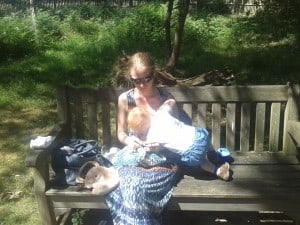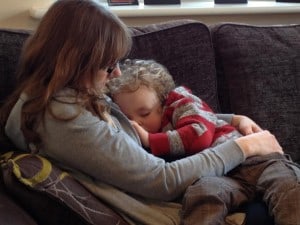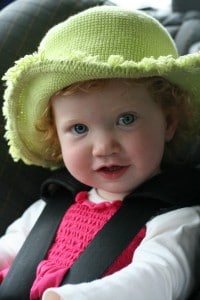Not so long ago you first held your tiny newborn and started on your breastfeeding journey together. Suddenly time has passed and you find yourself still breastfeeding an older baby or toddler – something you may never have envisaged doing! At this point you may wonder whether your child will end up ‘nursing forever’.
For many mothers, it is other people’s expectations which are the problem. Almost as soon as breastfeeding is going well, people seem to start asking when you intend to stop! Coping with pressure from others to stop breastfeeding is not easy, but you will know in your heart what feels right for you and your child. 
Why nursing is still important
Your milk is still nutritious
Although you will be introducing your breastfed baby to the exciting world of solid foods from around 6 months of age, your milk will remain his most important food until at least 12 months. Beyond this, breastmilk is still a valuable contribution to your child’s diet, providing up to a third of both his daily calories and protein needs after 18 months, as well as being a good source of vitamins and minerals. Toddlers often eat varying amounts from day to day so it can be reassuring to know your child is still getting your milk.
Protection from illness
Breastmilk continues to complement and boost your child’s immune system. Whilst breastfeeding is no guarantee that a toddler won’t become ill, it can help reduce the severity of any illness. When he is ill, breastmilk may be the only food or drink he can manage, especially during bouts of vomiting or diarrhoea. Nursing is also very comforting to a poorly toddler and can make it easier for you to cope with his illness. (See our article Amazing Milk.)
Comfort and security
Nursing offers security at a time when your child is developing fast and the world seems a confusing place. A mother is often surprised at how important breastfeeding remains to her older baby or toddler.
Breastfeeding beyond babyhood is normal
‘Weaning’ is the process whereby a child learns to take nourishment other than his mother’s milk. It starts when the child is introduced to foods and drinks in addition to breastmilk, and ends 
But children outgrow breastfeeding on their own, just as they outgrow other toddler behaviours. This process of ‘natural weaning’ can allow a child to develop at his own pace, giving up breastfeeding according to his own timetable. All children stop breastfeeding eventually, but some finish earlier than others. Rather than choosing a specific time to stop breastfeeding, many mothers just continue nursing while it’s working well for them and see how it goes.
Mixed feelings
Not all mothers are comfortable or wish to breastfeed their babies beyond a certain point. Or perhaps you feel that your child is nursing too much, or more than you are comfortable with? Before rushing to wean, consider whether breastfeeding really does make your life harder. Your child will need your constant attention and care for years yet, whether he is breastfeeding or not. Sometimes needs can be met more simply and easily through nursing than in any other way.
For many mothers, shortening feeds or reducing their frequency is enough to make them feel more positive about breastfeeding and confident that it will eventually end. Thinking Of Weaning?, How Breastfeeding Ends and the book Mothering Your Nursing Toddler offer suggestions on how to reduce or end breastfeeding gently while still meeting your child’s needs. Your local LLL Leader will have suggestions, and other mothers in your local LLL group will have found their own solutions too.
Comments from others

Out and about
Criticism can be easier to handle when you are happy and confident. Even so, you may start feeling uncomfortable about breastfeeding your older toddler in front of others. As a child develops the 
Breastfeeding manners
Setting some gentle limits on how your older baby or toddler breastfeeds is the start of gentle discipline and guiding him into good behaviour. It starts when you hold his hand or give him a toy to stop twiddling while feeding. If your toddler tries to breastfeed in unusual or uncomfortable acrobatic positions, you can let him know that it hurts and that if he wants to nurse he needs to sit properly. It’s best to start to set limits on how you will breastfeed before behaviour becomes a problem. If a behaviour you aren’t happy with has become a habit, it may take a little perseverance to change things. But even young toddlers respond to consistent loving guidance, especially if rewarded with breastfeeding and a thank you when they behave appropriately.
Conflicting advice
Some people, even health professionals, who are unfamiliar with breastfeeding an older baby or toddler, may claim that nursing beyond a certain age leads to spoiling, tooth decay, obesity or any number of other consequences! There is no evidence for this. A child’s secure attachment actually leads to independence.
There is evidence that tooth decay is dependent on the presence of certain oral bacteria and enamel defects. Limiting sugary foods (including dried fruit), drinks and sweets, and careful cleaning are better preventions than ending breastfeeding. There is also evidence that obesity is more prevalent in children who are not breastfed.
Children all develop at different rates: crawling, walking and talking at different ages. Why should weaning be any different? Children’s needs for sucking and closeness vary. If your child enjoys breastfeeding and it makes him feel good, what a great reason for snuggling up with him
Benefits for you
Breastfeeding helps:
• Calm an overtired or fussy child.
• Soothe you both if your child is hurt or in pain.
• Ease frustration and recovery from toddler tantrums. While clingy, demanding behaviour is normal in young children, some families find that when breastfeeding continues, the ‘terrible twos’ turn into ‘terrific twos’.
• You stay calmer and drift back to sleep more easily, thanks to those breastfeeding hormones.
• Reduce your risk of developing breast cancer
Thinking of weaning?
If you are thinking of taking active steps to end breastfeeding there are lots of suggestions in Thinking of Weaning? and How Breastfeeding Ends. The ‘don’t offer, don’t refuse’ method can be a helpful approach after the first year. Simply continue meeting your toddler’s need to nurse if he is hurt, tired or upset and wait until he asks when his need is less obvious. Offer a healthy snack, drink or a story instead—and see how he reacts. Encouraging your child to help you around the house and get involved in play can provide natural distractions when he doesn’t really need to nurse. Setting appropriate limits is the start of gentle discipline and can be a way of saving your breastfeeding relationship. How long your toddler is able to wait will depend on the situation, his age and temperament. Do make sure that you follow through and offer the promised feed later, so he trusts you and is willing to wait.
Wanting another baby
Regular periods generally signal the return of fertility. Whilst some mothers who aren’t using contraception become pregnant while nursing a toddler, others don’t become pregnant until after breastfeeding ends. Every mother responds differently to the stimulus of breastfeeding and there are no easy answers. Some mothers try partial weaning in the hope of getting pregnant, but many simply wait knowing that, with time, the breastfeeding relationship will become less intense and fertility will return. 
Pregnancy
Pregnant nursing mothers sometimes receive conflicting advice about whether to wean. Some mothers find their child weans naturally during the pregnancy. Other mothers continue to breastfeed during pregnancy and may go on to feed both children. This is called tandem nursing. See Further Reading for more information.
Finding support
It is easy to feel isolated when the reality of life with a baby or toddler does not meet your expectations. Being able to meet other mothers in similar situations can be a great help. La Leche League groups welcome mothers at any stage of breastfeeding, so you will often find mothers breastfeeding older babies and toddlers at your local group meeting. Some LLL groups run toddler meetings where you can share experiences and tips.
Feelings, needs and expectations

However you feel, do take care of yourself so you can enjoy caring for your child. Avoid making quick decisions to wean. A break, a nap, a bath, or just something to eat or drink, may be all you need to recharge before deciding what you want to do. Breastfeeding is a two-way relationship, and your needs are important too. You can adjust your approach as situations change. It isn’t easy when you are ready to stop breastfeeding, and your baby isn’t. To help your child move on, try to end breastfeeding gradually and with love while giving him your time and attention in other ways. Encouragement and support are always helpful when our children are moving on in life, from toddlerhood to teenage years.

A baby has an intense need to be with his mother that is as important as his need for food. Breastfeeding is not just food—it helps your toddler maintain the close attachment to you that has been his security up until now. The security of a baby’s bond with his mother is the basis for all other relationships and will help him to become more independent as he grows and develops.
There are many reasons why children need extra reassurance from nursing. Many little ones want to nurse only occasionally, perhaps for going to sleep and if they hurt themselves. But if your child seems to breastfeed avidly, it can help to look at what is happening in his life and yours. Perhaps he spends time away from you or particular demands on your time and attention take you away from him, such as other children, the telephone, the Internet or your job. Are you meeting his needs for attention, conversation and playmates, in addition to snacks and drinks, before he asks to nurse? You too may have got used to thinking that nursing meets every need. As they get older, children crave your focused attention as well. Sometimes nursing replaces other important contact: playing, exploring the great outdoors and taking part in household tasks.
If you need to be apart at times, his need for closeness may be more intense than ever when you are together. Satisfying this need will help equip your child for times when you are away. Many older children enjoy spending time with dad and only ask to nurse when mum is around. Young children often pick up on any emotional stress in the family, or changes such as moving house. Major growth and development milestones, illness or allergies could also be factors that influence his need for you. If you are feeling uncertain or worried about limiting nursing, you may find your child becomes anxious and asks to nurse more frequently. On the other hand, if you are confident about your decision and able to give of yourself lovingly in other ways, weaning is likely to go more smoothly.
Dad’s feelings
Perhaps your partner isn’t comfortable with his child continuing to breastfeed now that he is older. He may feel his toddler is too dependent on you, or that breastfeeding is only for babies. In your eyes your child is still your baby 
Expectations
Sometimes our expectations simply don’t fit with the needs of our individual children. While our society often expects babies to be weaned from the breast within a year, no one seems to question that many two and three year olds still suck on bottles, thumbs, or dummies, or need a comfort object. If you meet your child’s need for closeness and security the need will be fulfilled, allowing him to grow and move on at his own pace. Even the clingiest toddlers have grown into independent, adventurous adults.

“I know that some people look at a small boy climbing on his mum’s knee to nurse, hiding his face shyly in mum’s shoulder, or perhaps insisting on climbing into the family bed rather than his own, and worry that this little chap will grow up to be a ‘mummy’s boy’.
If anyone you know has expressed such concerns, you might like to let him know about my son Michael. He nursed until he was four, preferred to stay home and not go to playgroup until he was four and a quarter, and frequented the family bed for a quite a while. But at the age of eighteen Michael completed his RAF Regiment training, a very physically demanding course. Only eight of the original thirty-one recruits got through. Now a Corporal, Michael is a confident, mature and very caring young man.”
Written by Karen Butler, Sue Upstone and mothers of LLLGB.
‘Breastfeeding on the Tube’ – photo courtesy Brendan Williams
Further Reading
Adventures in Gentle Discipline Flower, H. Schaumburg, IL: LLLI, 2005.
Adventures in Tandem Nursing. Flower, H. Schaumburg, IL: LLLI, 2003.
Mothering Your Nursing Toddler. Bumgarner, NJ. Schaumburg, IL: LLLI, 2000.
Starting Solid Food
Thinking of Weaning?
Toddlers and Food
Breastfeeding Beyond a Year
Breastfeeding Beyond Infancy
This information is available to buy in printed form from the LLLGB Shop.
Copyright LLLGB 2016

